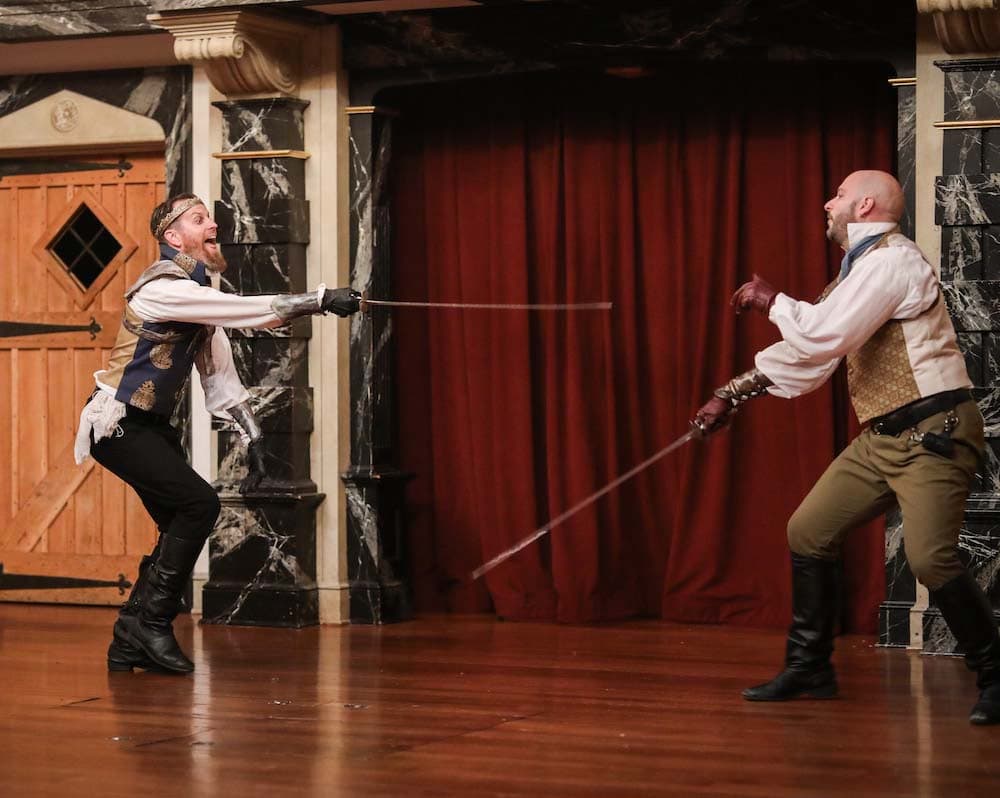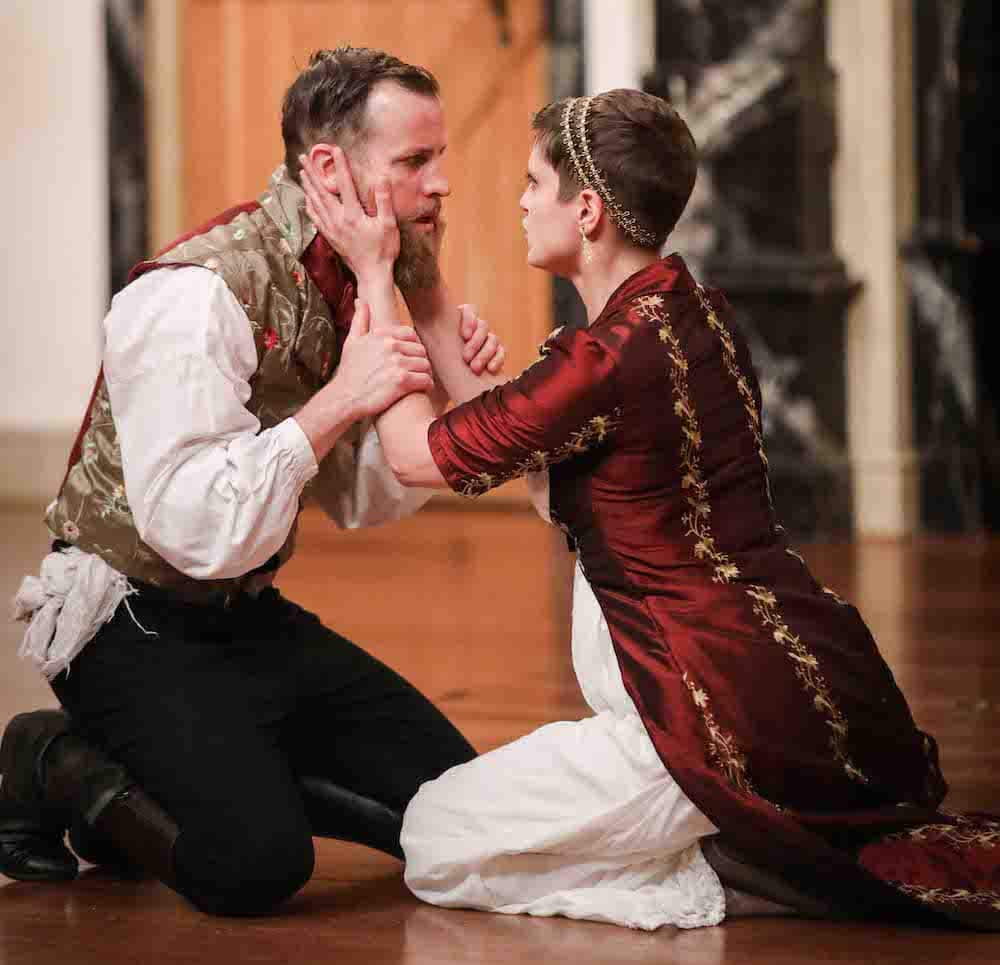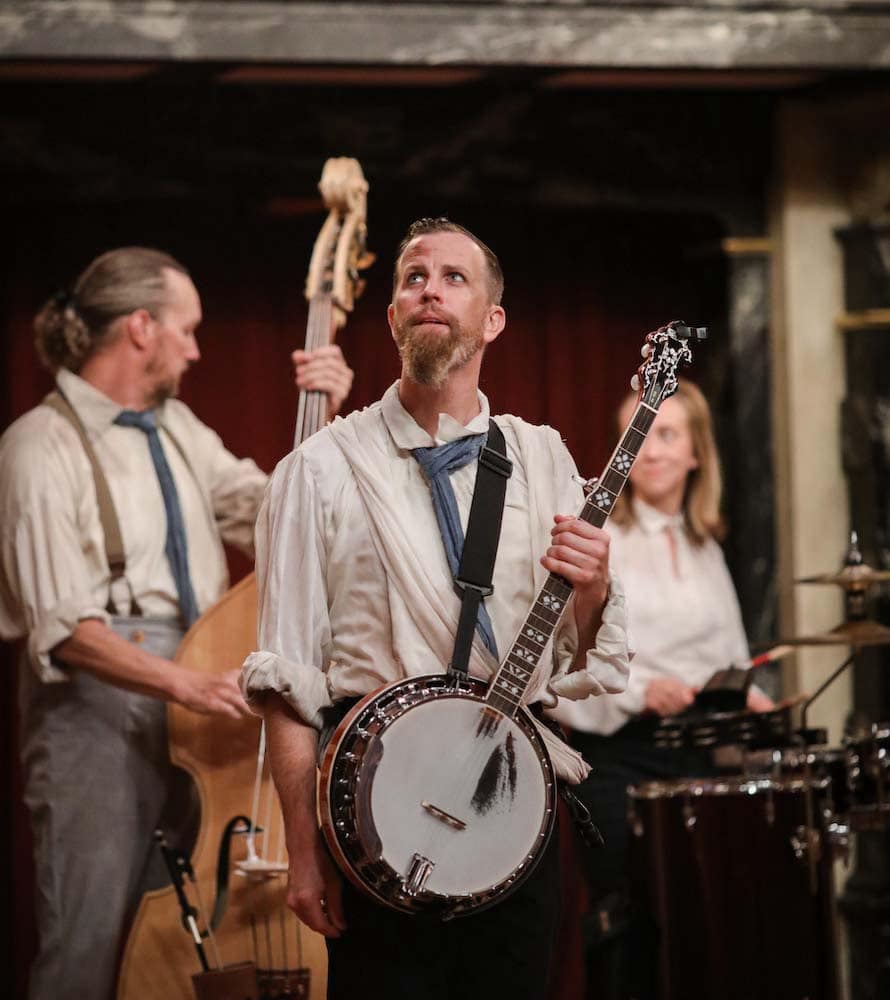Normally, dear reader, when you go to a Shakespeare classic like the one we actors call “The Scottish Tragedy” (and yes, the lore about the play is real—I’ve got stories…), you expect to see some fine acting among the leads. This is certainly the case here—Chris Johnston’s stellar performance as the Dark Scot, and especially his descent into madness after the murder of King Duncan, is riveting to watch. Ditto, Jeremy L. West’s turn as MacDuff. Zoe Speas’s Lady Macbeth, likewise, is one of the most bloodcurdling you will find anywhere—her appeal to the dark forces takes you places you’d never want to go, under normal circumstances.
But for me, the most thrilling part of the show was the climactic duel between Macbeth and MacDuff.

Wait, you’re thinking, he wants to lead a review with the fight? At the end of the show? Absolutely. Because when you’ve trained as an actor-combatant as I have, there is nothing warms the heart like a well-conceived, brilliantly executed crossing of swords. There are those who love Shakespeare’s flowery language, his sonnets, his soliloquys; but there are those who believe the most glorious, beautiful words in the Bard’s entire canon are: “They fight.”
Because this production of Macbeth was first performed at a venue with a low ceiling—a canopied, outdoor stage on the nearby Mary Baldwin campus—fight choreographer Jeremy L. West, whose MacDuff was already nicely done, decided to use smallswords: 18th-century dueling weapons that rely on lunges and stabbing moves instead of those flashy, windmill-like strokes. It may seem a bit odd for a play set in Medieval Scotland to rely on weaponry from the era of tri-corner hats, but trust me, it works. Oh, man, does it work.
Heart-stopping good, this duel is, and well worth the trip to see it. West and Johnston’s climactic fight ranks as the most unforgettable armed conflict I’ve seen at Blackfriars, and trust me I’ve seen a brawl or two. So good that even though you know who’s going to win (this being, like, the 15th time you’ve seen the show), you are going to forget the ending, the tension and the moves are so tightly executed.

The musical choices here are dynamite, and had last Saturday night’s rafters a-rocking with Franz Ferdinand’s “Take Me Out” (led by Chris Johnston on banjo, which in his hands is truly a rock ’n’ roll instrument) and a gorgeously nharmonized tribute to Prince’s “I Would Die 4 U” led by the up-and-coming J Moliere (who doubles as Malcolm and a Murderer once the music stops). It also makes a difference to see Zoe Speas step out, cradling her accordion, doing Steely Dan’s “Dirty Work” over Intermission, by the time of which her Lady M has already had her share of second thoughts herself.

Now of course, there are a few rough spots; truth be known, there isn’t a single Shakespeare production you will see, whether here or in England, that doesn’t have a mixture of expertise mingled with youthful enthusiasm that doesn’t always s hit the mark. Seasoned actors, with decades of experience in the Bard’s language, will give you the full weight and emotional import of their lines, while their scene partners will at times rush through them, their motivations well hidden in the interests of getting the lines out. So there are moments of intensity and clarity in this production of Macbeth, mingled with those whose dynamics are as yet unclear. This isn’t a knock on the company, but a matter of reminding them that they have an opportunity to continue to refine their hard work here, and elevate the production even further.
The current two-play repertory—Henry V and Macbeth—will soon be joined by All’s Well that Ends Well in early August, which will give you yet another reason to venture out I-66 and south on I-81 to this theatrical Valhalla.
Running Time: 2 hours and 30 minutes with one intermission.
Macbeth, a part of American Shakespeare Center’s Actor’s Renaissance Season, plays through November 26, 2021, in repertory with Macbeth, All’s Well That Ends Well opening August 7, 2021, and the premiere of Anchuli Felicia King’s Bard-inspired Keene due in October.
All performances are at the Blackfriars Playhouse, 10 South Market Street, Staunton, Virginia. For information and tickets visit americanshakespearecenter.com.
SEE ALSO:
American Shakespeare Center’s ‘Henry V’ is tremendous fun review by Andrew Walker White




